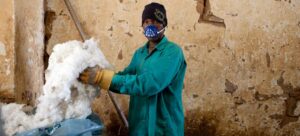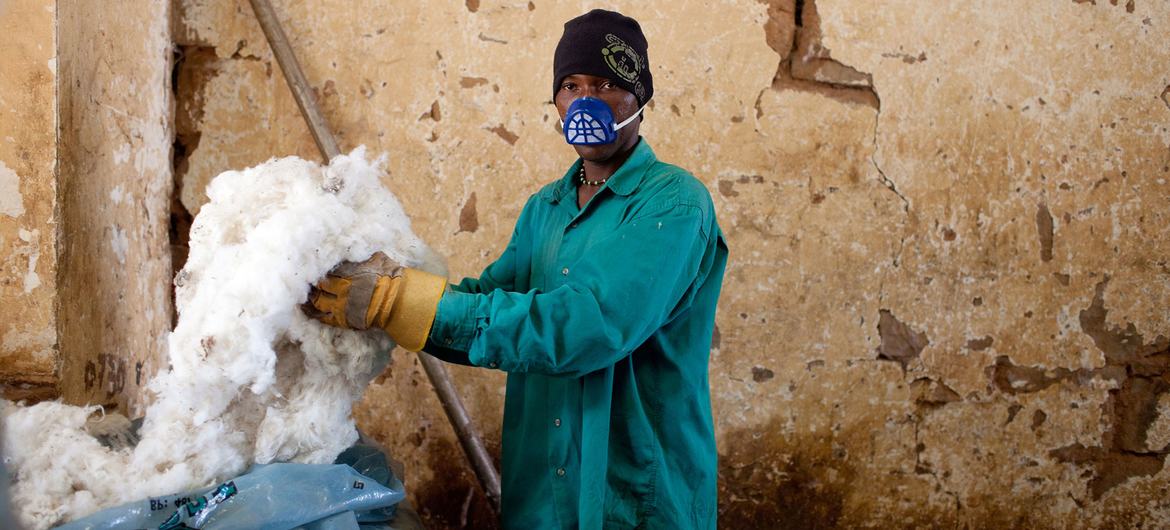World Cotton Day focuses on the fibre’s role in weaving socio-economic development

Cotton is a constant thread in our lives, from field to fabric, the UN agriculture agency, FAO, upheld on Friday, World Cotton Day, drawing attention to the natural fibre’s contribution in weaving socio-economic development and championing its advancement in sustainable livelihoods. An estimated 100 million family farmers across 80 countries…
The post appeared first on .


Cotton is a constant thread in our lives, from field to fabric, the UN agriculture agency, FAO, upheld on Friday, World Cotton Day, drawing attention to the natural fibre’s contribution in weaving socio-economic development and championing its advancement in sustainable livelihoods.
An estimated 100 million family farmers across 80 countries directly depend on the cotton industry, in which women play a key role.
From field to fabric, cotton is woven into our lives.
The cotton sector contributes to the livelihoods of millions of rural smallholders worldwide.
Let’s weave a bright path into the future & ensure no one is left behind 
#WorldCottonDay
FAO
Cotton supports the economies of many low-income and emerging countries.
Last year it contributed about $50 billion to their economic support – and $20 billion in global trade, according to FAO.
Moreover, it plays a significant role in social and economic development, international trade, and poverty alleviation, and it contributes to the 2030 Agenda for Sustainable Development and the Sustainable Development Goals (SDGs).
Culturally important
The cultural importance of cotton with its roots at the heart of human civilization, was recognized by the General Assembly in August 2021, when it proclaimed 7 October of each year as World Cotton Day.
It is the most important of the natural fibres, used daily in clothing and home furnishings, and represents an important source of export revenues for some of the poorest countries in the world.
Challenges abound
The day accentuates the need for a sustainable cotton sector that enhances production, nutrition, environment, and life, leaving no one behind.
However, market price volatility, climate change, pests, diseases, COVID, and the global economic slowdown are among the issues currently challenging the sector.
Furthermore, cotton faces a number of uncertainties on both the production and demand sides that need to be properly addressed if the sector is to realize its full potential in supporting economic growth and sustainable development.
Greater investments are needed to expand the sector beyond raw cotton production and create new income opportunities, especially for farmers, by adding more value to cotton fibre and developing by-products from other parts of the cotton plant.

Wonders of cotton
- Cotton provides employment and income for millions of smallholders, workers and their families.
- It represents an important source of foreign exchange earnings for low-income countries,
- And offers a way to address wider development concerns to empower women and boost youth employment.
Stepping up
UN agencies have worked towards the mission to optimize production and improve local processing capacities, as well as discuss the reforms needed to address high trade barriers and inequalities for cotton producers in developing countries.These efforts date back to 2003 through the Cotton Initiative.
And FAO has long offered developing countries technical and policy support for boosting productivity and creating more opportunities in the cotton value chain.
Boubaker Ben Belhassen, Director of FAO Markets and Trade Division reminded that the objective of the global celebration is to “draw attention to the hundreds of millions of people around the world who earn their livelihoods through the cotton value chain,” and stress the sector’s contribution to development.
Growing the fibre
- Innovative technologies and resources are vital to ensure that the sector remains viable and sustainable.
- Investments are needed to expand the sector and create new income opportunities by developing by-products from other parts of the cotton plant.
- An open, fair, predictable, and transparent international cotton trading system is key to supporting hundreds of millions of vulnerable people.
- Domestic support measures are critical to prevent trade and other market distortions from hampering trade liberalization benefits.
The post World Cotton Day focuses on the fibre’s role in weaving socio-economic development appeared first on HW News English.


